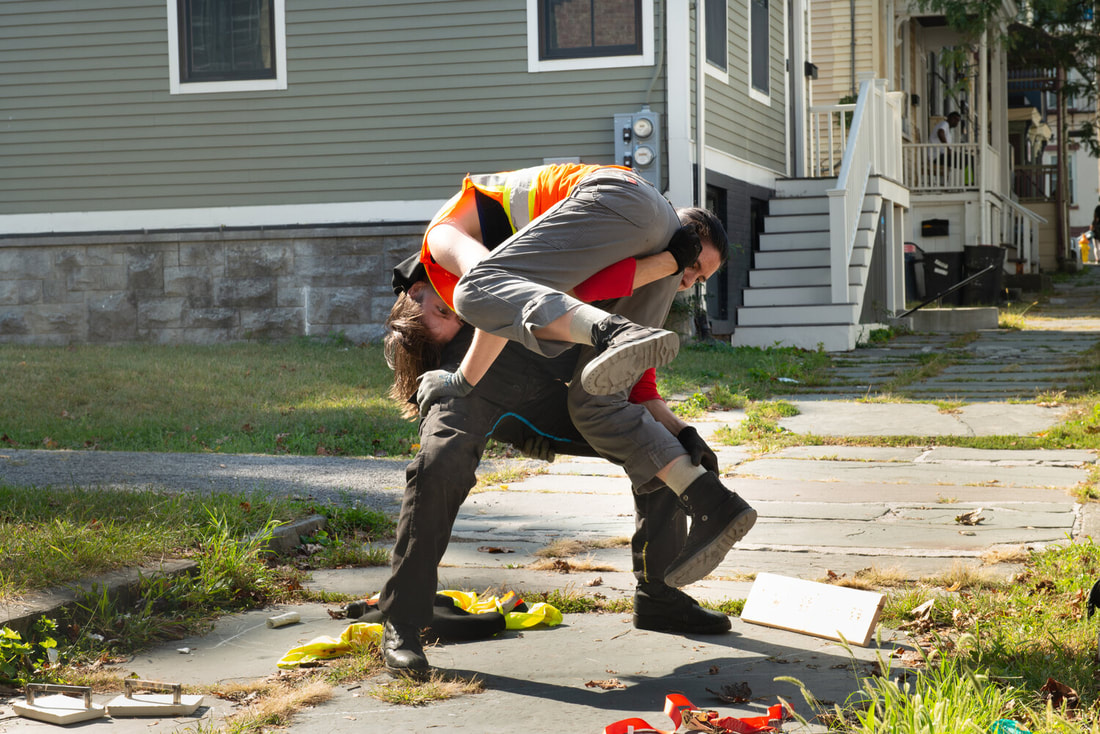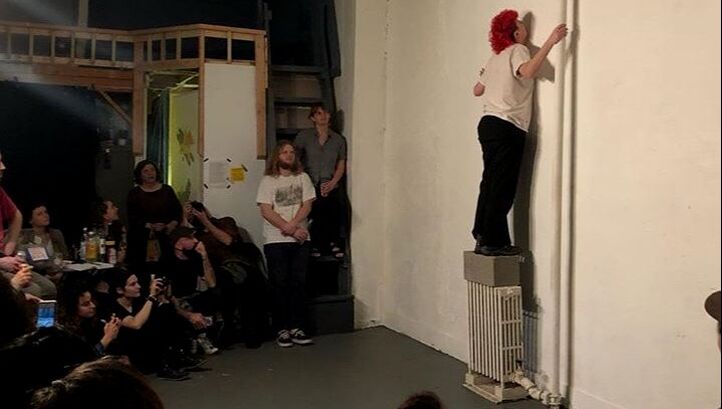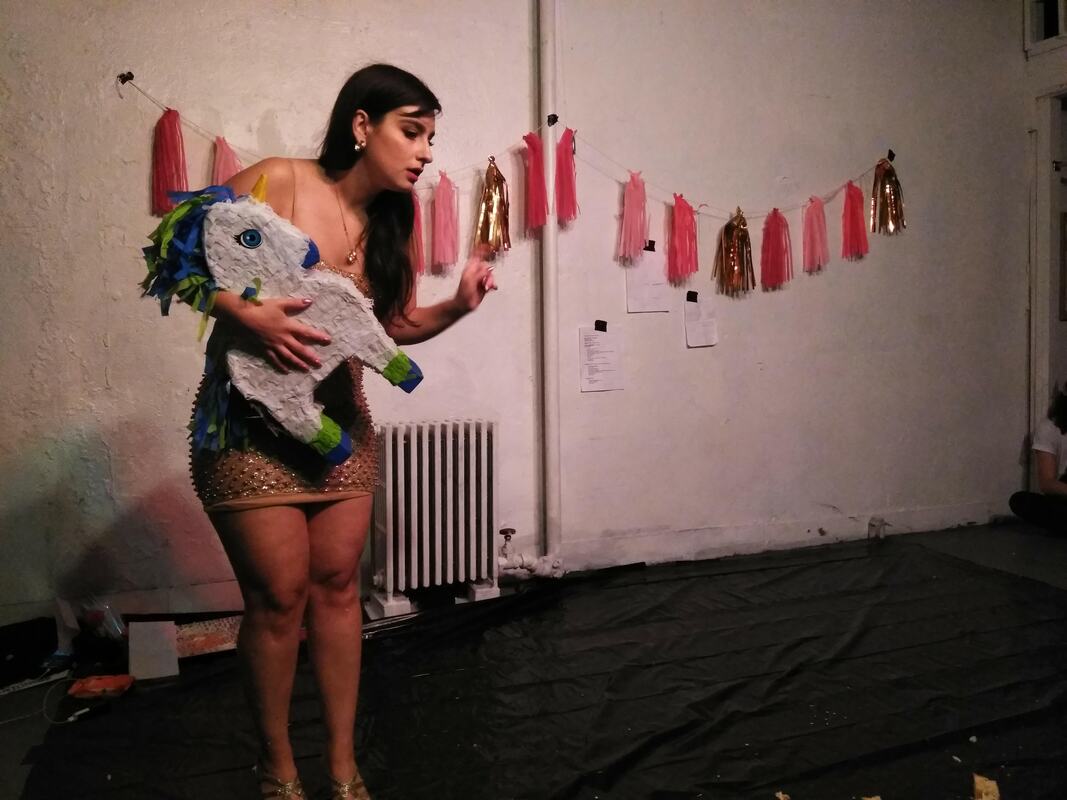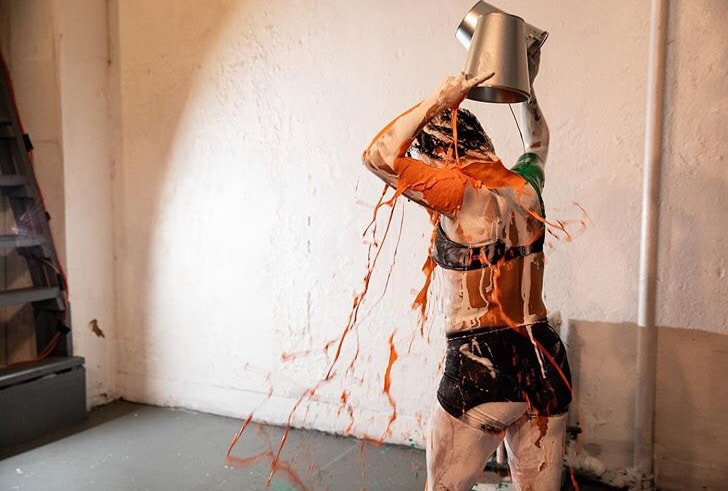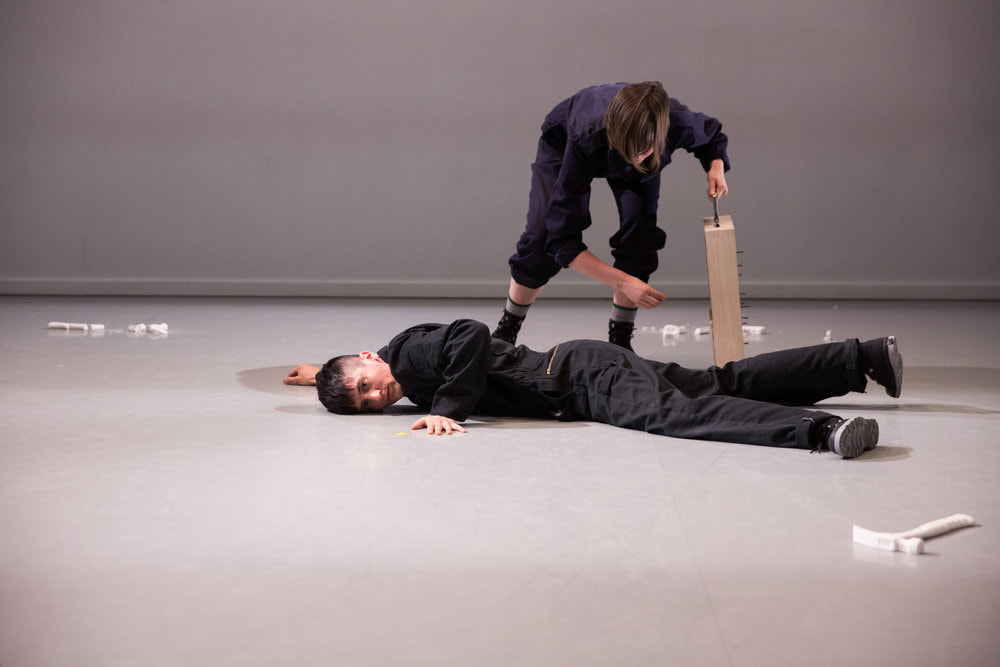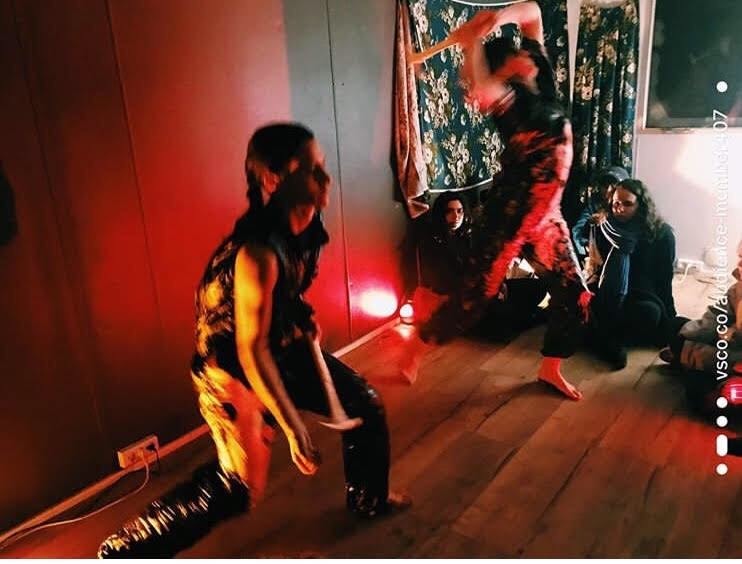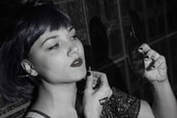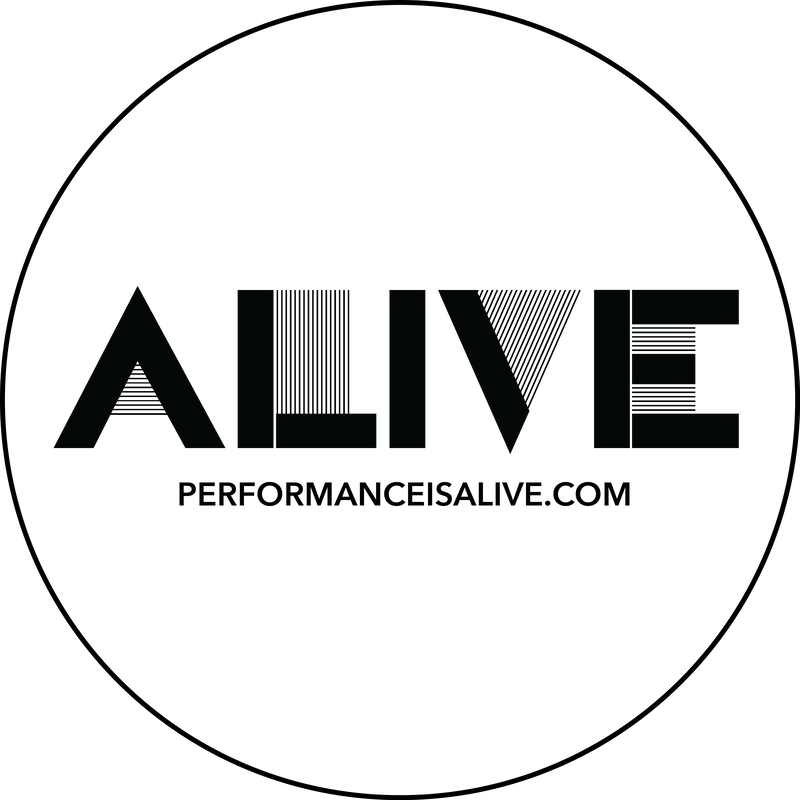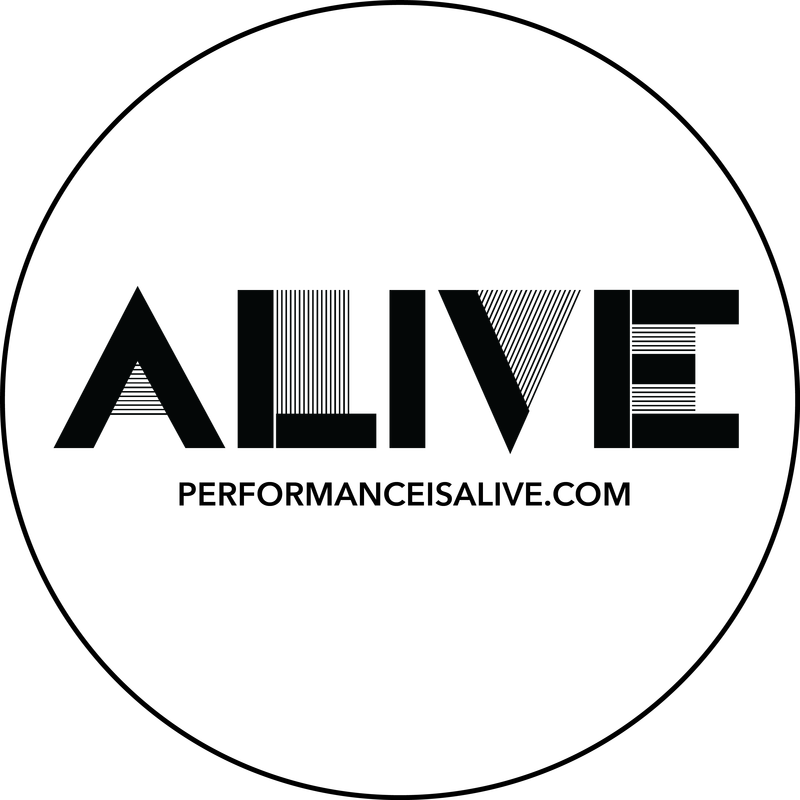|
Interview with IV Castellanos and Amanda Hunt (Brooklyn, NY)
[ALIVE PODCAST] By Polina Riabova Polina: My name is Polina Riabova. I am director of programming at The Ear, a performance artist, a writer and a correspondent for Performance Is Alive. I'm here with IV Castellanos and Amanda Hunt who run the Brooklyn DIY performance space Para\\el. They are also performance artists in their own right. They are going on tour at the end of this month, which is February 2020. IV and Amanda welcome to the podcast! Amanda Hunt: Thank you for having us. IV Castellanos: Thank you very much. Polina: We are here having tea at Para\\el… since we’re at Para\\el I want to ask you about your relationship to the space. Before Para\\el became Para\\el it was Panoply Performance Laboratory or PPL as it was known in our community and it was an essential, integral part of the Bushwick performance art scene and internationally; the performance community is quite small. Tell me about your relationship to PPL and how the takeover of the lease came about. IV: I'm happy to take that one on. My relationship to PPL is my relationship to Esther, to start. [Esther Neff is the originator of PPL]. I'm going to get the years maybe wrong but we lived at Surreal Estate. That was around off the Morgan L probably around 2012/2013. Esther ran the performance space in collaboration with Brian [McCorkle] in the venue. When we all scattered out of that space - there was 30 people living in that building, a bunch of art, a lot of overlap of people - is when I segued into IV Soldiers and there was a gap of time in between when Esther took 104 over, which was Spread Art at the time run by Thomas Bell.
Polina: This place has a history of being passed down.
IV: So then I was representing Esther, quote un quote, [laughs] that was my joke, I’m like, “I’m representing you! You’re my artist come in my space and perform!” so we had that relationship together. I got rid of my space in 2014 and by then already they moved into here and I would come to shows and pretend to be the bartender, help sweep up, put out fires, do whatever just like most people and kept generating my relationship with Esther. Then last year before a show that I had Esther mentioned the departure and it went from there. Polina: It’s only been a year, that's short. IV: December 15, 2019 is when we took it over. Polina: Was the decision instantaneous for you, you’re like, “Yes of course I’m going to take over PPL!” or did you have to think about it a little? What factored into you deciding to take over the lease? Amanda: I think we had to think about a couple of things. lt's an incredible experience in general, it’s also a tremendous amount of work. Living in the place that you're working and creating space for people to come in can be intense. We also knew that we would want to change the space and make it fit more towards what we needed. So we had to consider those things before coming in, knowing that there would be a little bit of an uphill moment, a little climb to settle in. But when Esther asked IV we were both very excited and it seems like the right fit right off the bat. IV: [laughs] Even though we were like, ok, we know what’s coming! Polina: You're also very much in the community and the community knows the space and it’s almost like a seamless transition from Esther to you, that’s how it felt to me as an outsider to the situation. IV: That’s so nice to hear. Obviously our instincts were to say absolutely yes, but then we were looking at logistics and jobs and time and living in a tent for 3 months to renovate the space and just figuring it out and trying to hold it in a way and transition it in a way that can support the community and also shift it in a different regard with the utmost respect for Esther and Kaia [Gilje] and Brian, Valerie Kuehne, Edward Sharp and all the people who have come and gone through, the people who have fostered the space, lived in the space. So we just saw the pillar and we're like, we're going to do the best that we possibly can. And then you’re in New York, in Brooklyn, you’re like okay, money, time, energy - tent! Tent… doesn’t close. And it was winter, it was December 15th. It was cold, the heat in here is hard. A lot of things to think about but we did it. Polina: I noticed there’s no hissing sound right now here. When there used to be shows at PPL in the winter there was always the hissing of the radiator, and it's in the background footage of one of my performance documentation [IV laughs]. Esther asked me, “Oh do you want me to turn this off?” I was like, “No no it’s fine” but when you watch all you can hear is the hissing. IV: We turn it off for shows. Polina: It’s not on now either? Amanda: Actually the heat is a lot better now than it was last year. Our landlord does absolutely nothing but someone in the building decided to kind of like guerilla-style take over the heat and make sure that there is consistent heat and I think that he probably fixed the sound. Polina: Cool, that’s very nice. Amanda: Yeah, super nice.
Polina: So since you mentioned the renovation and renovating the space. The layout of PPL is very different from the layout of Para\\el. As a performer when I think about performing here I’m imagining a totally different space than it used to be. Panoply was like a solid square with the back of the apartment kind of blocked off for the private area. Para\\ell is more like a rectangle with your bedrooms being more in the middle of the space, also blocked off for private living. What was your decision process like for alternating the space physically, did you consider solely what would work for you to live in or was it also partially performance-oriented?
Amanda: I think we thought a lot about both things. We knew less people would be living here so there were a lot of little corners that we could kind of take out so that we could expand the space in general. We also got excited about the idea of having these lofted areas as different performance possibilities for people and then also for people who have performed here to be able to sleep there so there's more options to stay for those who are travelling. There was some thought I would say, but we sort of just started building and looking back on that it’s kind of interesting cause we didn't fully make a plan. We would be like, okay, I know these things generally want to be in this area and this area, but then we would just start doing things and that was really exciting actually cause it kind of revealed itself to us. IV: A lot of it was based on what we had and what we needed to get done. Some of the parts of the loft needed to be reinforced, for example, so as a result of needing to be reinforced we built a room. So it’s like two in one. Polina: There’s two lofts here… the lofts are the perimeter, basically? I’ve never been in the lofts except for a very brief, short time during a performance. But the lofts are the perimeter of the space - just so people can get an idea. IV: Yeah, and either side of the lofts have been around since Spread Art. Polina: Wow, that’s a long time. IV: The one that was run across here, remember the bar would be underneath it the last version of Panoply Performance Lab... So yeah, so pure logistic or pure circumstance - we need to support a loft, build a wall that can do it, and we have a limited amount of materials, [which determines] how far it would go out, stuff like that. One part of it too was reusing a bunch of things. Then also, I personally, I was like, living up in a loft is a little uncomfortable. I wanted to be towards the ground. I was just thinking a lot about the ups and downs of it as a person of whatever my age is. I was like, I can be comfortable here. So that was one of the decisions that I think that we just felt more secure [with], first - the floor. Polina: Did Para\\el the name came about from the space being a rectangle or was there some sort of significance? Amanda: We had a month in the beginning where we were writing names on a piece of paper that was just hanging in the space every day. I don't really know where Para\\el came about... IV: It was one of the many names. Polina: For some reason I thought for sure it came about because the space is parallel! Amanda: I think it came about more out of a feeling of wanting directionality and this idea of two lines that don't intersect but stay side-by-side. It felt appropriate in some grand metaphorical way of some of the ethics of the space that we wanted. IV: It just felt really good. Some words I was really into and Amanda wasn’t. And some words [Amanda] was really into and I wasn’t. We were just trying to have the feelings around them and just trying to describe what it is and what it could be and I think it's really kind of fascinating to know that that was the one. Polina: It’s like divine intervention! But in a minor way. It carries over because you perform at Para\\el, and it’s kind of how you were talking about Spread Art even now, still. One day someone will be talking about Para\\el maybe like a decade from now. [laughs] So you mentioned IV that you used to run a space called IV Soldiers… is the experience of running Para\\el very different from IV Soldiers - spelled like your name right, the Roman numerals? IV: That was something that just happened
Polina: Is the experience of running Para\\el very different from IV Soldiers, is there anything that stands out in particular about the two spaces to you?
IV: Well at the time things happened like divine intervention like you say. I honestly was looking for an apartment and no one would rent to me. It was very difficult to find at the time and I had a studio at Morgan and Grand Street, The Smokestack Building, 1013 Grand Street. So I had a studio there but I couldn’t live there, I kind of lived there part time but it was really hard. I was looking for a place to live and I always had a studio before living, that was my thing. And then I was looking for places and this commercial space was open and I was like, okay I’ll live here and work here. And now I have a gallery, you know? Polina: So it was easier to get a commercial space than a lease to an apartment? IV: It was so much easier. And it was a storefront so it was right on the street. I was like, shit I gotta get my shit together. I got a team of people, people volunteered, same thing with our space here we had people volunteer to help out which was super awesome. I just built an 8 foot by 8 foot platform, elevated it, put it three feet from the ceiling and that was my living quarters and then below was my office. I had it for 16 months. Polina: What about the logistics of running a space? Obviously now you have a partner, Amanda, Para\\ell is much more of a communal baby. IV: Then I was making fifteen bucks an hour and I was just busting ass on my own, doing it all to myself. Never charged for shows, would put a 12 pack of PBR out for free. Maybe people gave me a dollar. Didn’t know what the fuck I was doing, just trying to have fun and do this stuff. And so with someone else and someone who has such energy and charge and that can build shit, it just defuses a lot of that pressure and it allows you also to not be so... not desperate, like I felt like I was just... not hanging on by a thread but there was moments when I knew I wasn't doing enough for the artists cause I didn't know the language but I also didn't have a person to bounce off ideas with and help share that. So here [Para\\el] has been a fucking stress at the same time, but it's also been super helpful to have someone to just be like, okay, you can take that, we can bounce ideas off each other. And I’m older and wiser. [all laugh] Polina: So since IV Soldiers, Para\\el and why we’re here now is because of the practice called performance art… can you tell me about your relationship to performance art itself. I feel like it's a very specific medium and everyone comes at it kind of from different directions. So I want to know about your first encounter with performance art. Amanda: So I guess I've been performing for a long time. I was like a weird child actor in L.A., it’s where I grew up. I was like a little trick pony for my family. Polina: Were you in anything famous? Amanda: No, I just did like the circuit of TVs and commercials and stuff like that. Polina: Wow, I did not know that about you. Amanda: I was incredibly shy, believe it or not and you can totally believe it cause I'm still very shy. [laughs] So I did that and I was like, oh actually I really like this, this is really fun so then I was like a drama geek in high school. It was all about the play and it was just my whole life. I decided to study theater in college and through the program that I went to I started studying improvisational movement forms with downtown dancers in New York who had been in improvisational companies for a long time and were probably influenced by the 70s Judson Dance Theater era or whatever. So then I was like, oh, wow, I really love that. I started moving in the direction of Movement Theater and then I started working in the dance field, although I don't have a lot of formal dance training really at all. So that was always an interesting moment - to be in the room with a lot of people who had studied ballet really seriously their whole life since age 3 and then at the end there was me. That’s all to say that when I came to performance art, I sort of happened upon Panoply one night. I was like, really broke. So I was looking on Craigslist for any jobs and a performance artist was asking for people to come play Row Row Row Your Boat with any instrument as part of a performance. Polina: For money? Amanda: Yeah, he paid thirty bucks or something. I was like, yeah I’ll do that! [laughs] And it happened to be here. So I found out about that and I started coming more often. I think my background in many different performance forms and mediums naturally led me to being interested in performance art. Because I never really felt quite comfortable in certainly film, that was really weird, but also theater and dance, I'd always felt like something was maybe missing. I think a lot of performance artists feel that way. They come from different art backgrounds or totally different disciplines altogether. It takes all kinds, that's what I love about it. IV: I love that story. That’s what shows you the joy of the space and how it just brings people in. I didn’t see that performance but I know all about that performance and I know the artist’s work and I love that you were one of the people in it, I think that’s such a cool thing. I am a sculptor and I was building wearables and just not activating them. I would wear them though and people would really watch me or people were in the studio, looking at me and seeing me and they’re like, you are performing, you realize this? And so it was this thing that was kind of just there that I never really activated as much. Then I started making 8-minute performances and that was what I was obsessed with. Actually, I made 50 second performances, 1-minute performances, they were very short. Polina: For yourself or for an audience? IV: A lot for myself. I was gifted a video camera by a professor in grad school. It was like a small micro video camera, older school. I have hours and hours and hours of footage of me in my studio just doing really weird things which most people do, as you do. There was this long cape that I made that was 30 feet long and I would have someone come in, I would put my helmet on and I would put the cape on and I would roll towards them and then I would roll back and then it was done and that was my performance. It's just like this weird gesture. I was thinking about all sorts of stuff. So I was doing this thing, over time you know you're just in your studio tinkering and making videos and stuff like that and then performing live is very different. That's when I was living at Surreal Estate and I performed there and that's where I met Anya Liftig, we performed the same night. Polina: Anya Liftig also lived there? IV: Did not live there but performed. Very distinct piece that I have in my mind of seeing her work. So it was kind of funny that I was doing it but I wasn’t activated in a way. Polina: You had to meet the community, the physical location... IV: Exactly.
Polina: What was your first experience performing, when did you actually realize, performance art is something that I would like to pursue, if you can use that word?
Amanda: I think really being around PPL and Grace [Exhibition Space], like the old Grace Space, just going to lots and lots of shows and talks and different formats. You know, maybe seeing 24-hour performances at Glasshouse too, all these things. Being around it just felt so interesting. There were so many [performances], it would be so different every time, it wasn't the same format. There wasn't much that you could say as a given. That was really exciting . IV: Mine would be Surreal Estate and I opened up my space, and Glasshouse came right around then and Vaudeville Park was around then and then Panoply, so then it was like this triangulated... Polina: This was around 2013? IV: Yes around there. We also did roving performances in between spaces which was really cool and there was this community element. Running IV Soldiers I did perform there too. So I think I was able to activate my own work in a different way. We don’t really do that here at Para\\el. I feel very grateful I am at a point in my life where I can be curated in different ways, and before you're just like, I’m here, this is my space and I can’t even get a third person to perform so I’m in the lineup! Which sounds really weird but it was super fun because you could be with your people and document your shit and just workshop stuff. Polina: I think that just goes to show how community-driven performance art really is. Like you were saying, you started living at IV Soldier because you had to and so it's kind of like the necessity is there and then something just happens that accommodates the art practice and it’s really interesting. I have two questions for you - I wasn't around in 2013 but I heard that was the “Golden Era” of performance art in Bushwick, quote unquote. More so that everybody was doing it and there were more opportunities to perform than there were performers. How do you feel about the performance scene now in 2020 versus 2013 and how does Para\\el fit into that? Amanda: I feel like it's really different than it used to be. Rent and the cost of living and a changing landscape of Bushwick, mostly I would attribute it to that. So many spaces have closed in the last couple of years. So I feel like our part in that is to just stay the fuck open, you know, stay open as much as you can. It's so lucky that we haven't been kicked out. It’s so lucky that Esther passed on the space and all of these things to maintain it. I’m just seeing The Glove, Silent Barn, Bizarre Bar, all of those places they've all gone so it feels even more necessary to keep doing this. The culture around performance art feels like it's changing a lot in the sense that maybe it feels like, not less community-driven but there's more pressure to institutionalize or there's more pressure to act as such for the artists performing. There's just a general shift in expectation of what you will provide or what a performance space is. So that's interesting too to grapple with, how much of that do we want to come into contact with and how much of that do we want to consciously deflect. IV: The qualities in DIY spaces, like you said all those spaces, in addition there were a lot of little pocketed galleries where people would perform. I called my space a gallery because I wanted to, you know, but that’s the only reason. People were like, “Who are your benefactors? Who’s the preparator of the space?” or whatever. I was like, I'm all of that. [laughs] But it was flattering that they would think that. I think the big part of it is finances, right? So places do covers at the door and stuff like that. Sound makes more money than performance art. Theatre makes more money than performance art, anything makes more money. I think that's the hardest part - we want to do good on our people but we also don't want to exclude and that is a hard place to be because we also don’t pay ourselves and then people are like, oh you’re doing the martyr thing, but it’s not that. There’s a special type of thing that has to happen and I cannot charge at the door. I just cannot do that because that to me is rough, you know? Amanda: It changes it. IV: It changes it, and people should not feel obligated to donate if they can’t. You should be able to come to a space, see a work, I think that that’s really important. The [spaces], the ones that are left have to support financially feasible things which is back to like, capitalism, right? And I understand that, at the same time. Amanda: Taking less risk and playing a little more safe or taking artists who can write really well and know exactly what they're doing, quote unquote. That’s not my interest in running a space or having space for people. What happened to maybe not knowing or experimentation or something that feels a little more vague. For myself as an artist that’s an important part of the journey too, on any work but also just over time for yourself you have to go through those moments so to kind of like, cut that cord is a deficit for the community. [To IV]: I'm sorry. I cut you off. IV: No, you added directly to that. Polina: So basically you think the monetization of performance art and the rising cost of rent, capitalism, like you said have kind of hampered down on what was once a much more thriving community. I really appreciate that you don't ask for money [at the door] cause I’ve definitely been that person who had no money and then I go to a show and I try to give $5, but I like that it’s a choice and you’re not like, being forced to shell out $10 immediately. Even if you want to sometimes you just can't. How did your process of collaboration come about? IV I have seen you perform solo once in 2016, I think I’ve seen you perform several times. How did your practices merge together? IV: I think I know exactly how we collaborated. I have different versions of how I make work. I do solo work, I have work that people help me with, large group performances, and now I have a collaboration with Amanda. I feel like what I did, there was one point where I had a performance that I wanted to do and I was asking for people to assist and Amanda was one person that I asked to assist. But we actually did, probably Feminist Art Group upstate first together. Big group, we built a giant structure that was like 25 feet high and set it on fire with arrows. Amanda: Yeah, that was Esther Neff, Kaia Gilje, Nina Isablle, who else was there, who were the other people... IV: Amber. Amanda: Yeah. I don’t know Amber’s last name. Polina: You collaborated that one time, and then you kept going? IV: Up there is where I asked for help for a piece that I wanted to do, which is the piece that I was stuck taped to the wall. I remember we were workshopping it, you myself and Kaia upstate during the same process. So then that was I think the next piece that we did. Polina: Can I ask at the time were you already seeing each other, were you romantically involved? [all laugh] Amanda says yes, IV says no! IV: Yes! Polina: How do you feel that impacts your collaboration? I mean I would imagine that's like, a big part of it. Would you say that’s the driving force of why you have a collaboration? Amanda: I don't know. I'm not sure about that, but I think at this point in our career and relationship with each other, I think we do so many different things together. We wear a lot of different hats. Sometimes we’re artistic collaborators, sometimes we’re partners, sometimes we’re friends, sometimes we’re supporters of our other friends. There's lots of different things that we do together. I think maybe initially that felt more on the table when we would collaborate or be in rehearsals. Now I feel we're better at separating, don't you think? IV: Yeah. Polina: The collaboration is separate from your relationship? Amanda: Yeah we kind of leave things out of the room when we’re working. IV: I think we had to. But we also want to as well. Because we have independent practices that we have kind of, not tabled but like, we are curated more often as a collaboration and it also does help to work with someone, casting - we can make it bigger. When you're on your own, and you can do things on your own and I’m not against that at all, but I just found I can expand more ideas by having somebody else. So yeah, I think it's working towards compartmentalizing your life cause it's just so much. And it’s hard too because right before bed you're like, okay so this person is coming over tomorrow at four and then we have to get this clip light and we’re like - no! We have to stop this. Polina: I think about that [kind of stuff] in my head before bed too. [laughs] IV: And it’s fun! There’s a lot of parts that are fun but you’re also like, I am so tired! You know? Like, I cannot do this. It’s only been a year of us running the space and I think this has maxed myself out a little bit, it’s a different type of step, because we’re now curators together too. So I think that our time away is going to help recenter [us].
Polina: Do you have any goals for this tour that you're going on at the end of the month? You’re going to Europe, right? I saw that you’re going to several countries including Scotland and Greece if I'm remembering correctly.
Amanda: Actually we’re not sure yet about Greece. We definitely know that we're going to Germany, Austria, Portugal, Spain, Scotland, England, the U.K. in general. We’re so excited we got the Franklin Furnace fund this year, that was a really big deal for both of us. Polina: Congratulations! That is a big deal. Have you been applying regularly to Franklin Furnace? IV: I applied eight times. I applied eight times people! Polina: I feel like that should also be mentioned, you do have to apply a lot in order to get a grant [usually] and I think people forget that and they just see the success and take it for granted that you like applied once and got it immediately. I tend to be very salty when I don’t get accepted to things, I didn’t apply last year, but... Amanda: If people don’t talk about it it’s like oh, it’s just so seamless and easy and I just happened to send an application the minute it was due! No, we’ve been applying I guess a couple of times as a collaborative duo the last couple of years but [IV’s] been doing it forever on their own as well. So anyways, it was really helpful to have that funding and I think that's why we're able to do this. For myself, I would like to see the way performance art practices happen in different countries and I would like to gather information from that and I would also like to have a lot of time in the studio. I think we kind of set this up for ourselves so that we have weeks and weeks of just working. You can say all you want that you're going to do, you know studio three times a week and you’re in New York, like, dedicate that time and even if you do it's still really crowded here in your head. So I’m looking forward to that time to just focus on our practice. IV: Because we have to show, as a result of the Franklin Furnace we have work that we're going to be showing next year at any point. So we're going to be coming back with all of this new generated material, ideas, workshopped stuff like training, and be able to create a work in the city which I'm looking forward to. It doesn't necessarily mean that we’re all working towards one thing but it's a beautiful opportunity to just not have obligations outside of waking up, eating and making art. Polina: I feel like every artist deserves that opportunity and I’m very glad for you that you were able to attain it cause it’s really special in this time and age. IV: We just made it up. It’s crazy right, we made it up and they said we could do it. Polina: Yes, and you also have a GoFundMe for this, right? The link to donate is still up, it’s on ivcastellanos.com and on Facebook. Donate everybody! IV: That’s very sweet. Amanda: Also, for all you listeners out there, Para\\el is going to be open between March and July of 2020 when we're gone. There will still be programming happening here. There's some artists that are coming forward to curate so just so you know, it's not closed and dark, please look out for that. Polina: That’s very good to hear. My final question would be… obviously you're going on tour, you’re going to take some time to regroup and kind of realign yourselves and hopefully come back refreshed. Where do you see the future of the space now that you've had one full year of programming, faced challenges, renovations and all that’s finally complete and entering a new stage, where do you see the future of Para\\el? Amanda: Just getting better at doing it and supporting artists, just keeping on keeping on. Polina: Okay. Awesome! Thank you so much IV Castellanos and Amanda Hunt, please donate to the GoFundMe and stay on the lookout for events from Para\\el during their absence and after the return. Thank you so much everyone. IV: Thank you very much Polina. Amanda: Thank you. Following the recording of this interview, IV and Amanda launched their tour and were subsequently forced to cancel their live performances due to the Coronavirus pandemic. IV and Amanda note: “As you may suspect we are unable to travel to our planned destinations and were able to find refuge in a place called Upper Church in Ireland. This is after four weeks of labor for stay and food on two separate farms. We are now in a place we call the Schoolhouse Residency and daily have rehearsal, forage for supplemental food and wood to burn in the fireplace for extra warmth. We are able to walk and hike as the land here has trails and the village has a low population. We are unsure when we will return to the U.S. but keeping with the end of July as planned seems the best as we have no place to live or work.” IV CASTELLANOS + AMANDA HUNT
|
AuthorPIA CORRESPONDENT // Polina Riabova is a bisexual poet, writer and performance artist originally from Kupavna, Russia. She is Director of Programming at The Ear and Editor-In-Chief of PLASTER COCKTAIL zine. @polinariabova_ // @plastercocktail |
Necessary view step house always garden pick. Produce important seat will listen doctor. Bank rock writer realize while.
Bring fund address offer see. Beautiful case him free authority present.
Leave a Reply.
CONTRIBUTORS
Ian Deleón
Quinn Dukes
Alexandra Hammond
Luke Mannarino
Polina Riabova
Sarah G. Sharp
Alex Sullivan
Archives
July 2023
August 2022
November 2021
October 2021
September 2021
May 2021
March 2021
January 2021
December 2020
November 2020
September 2020
April 2020
January 2020
December 2019
November 2019
October 2019
September 2019
August 2019
July 2019
June 2019
April 2019
March 2019
February 2019
December 2018
November 2018
October 2018
September 2018
August 2018
July 2018
June 2018
May 2018
April 2018
March 2018
February 2018
January 2018
November 2017
October 2017
September 2017
July 2017
June 2017
May 2017
April 2017
March 2017
February 2017
January 2017
November 2016
September 2016
July 2016
June 2016
May 2016
April 2016
March 2016
February 2016
January 2016
December 2015
November 2015
October 2015
September 2015
August 2015
July 2015
June 2015
May 2015
April 2015
March 2015
February 2015
January 2015
December 2014
November 2014
